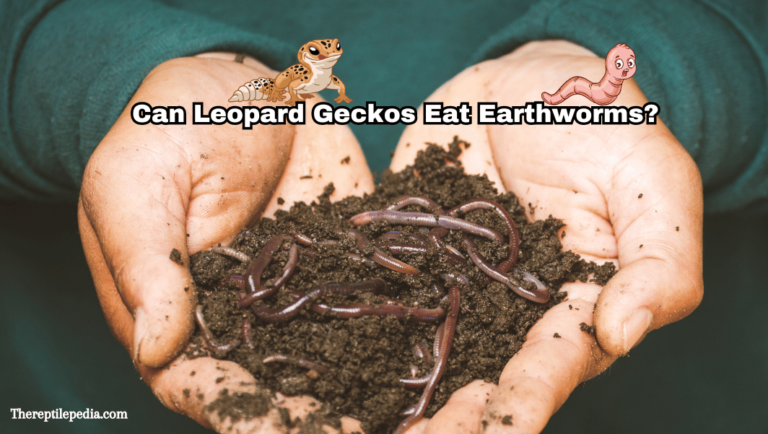Yes, leopard geckos eat earthworms, but there are important considerations to keep in mind. Earthworms contain a substance that some leopard geckos find repulsive. This factor makes earthworms unsuitable as a staple feeder insect for these reptiles. It’s essential to understand that while earthworms have a high protein content, they are low in calcium, which is a crucial nutrient for leopard geckos.
When deciding to feed them to your gecko now and then, it’s vital to ensure these worms are from a credible source. Avoid collecting earthworms from your backyard, as they may contain parasites that will make your gecko sick. In conclusion, while leopard geckos can eat earthworms, they should only be a small part of a varied and balanced diet, and always sourced responsibly.
Table of Contents
Where are earthworms?
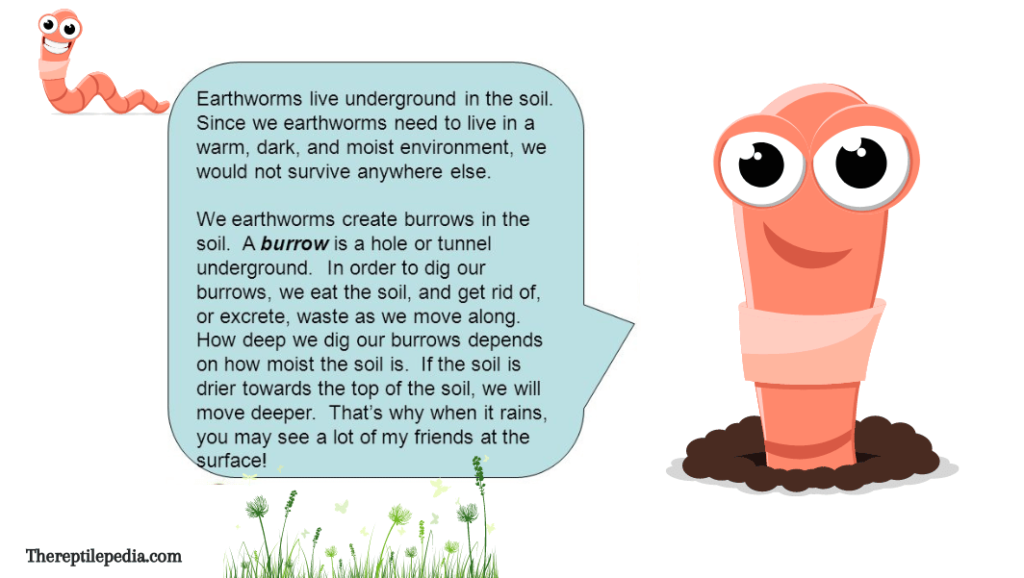
Superworms are a popular worm species in reptile diets, distinct from earthworms. Unlike earthworms, which emerge from wet soil after rain and breathe through their skin, superworms are the larvae of a beetle and live in a drier environment. These worms don’t have the same role as earthworms, which are beneficial in breaking down dead organic matter and aerating the soil. Superworms are known for their high protein content, but they lack other nutrients that earthworms provide, such as humus for plant growth.
While earthworms are hermaphrodites with both male and female reproductive organs, superworms have separate sexes. Their mating habits differ significantly from earthworms, which usually mate when the ground is wet. Superworms are larger and have tougher skin, making them a more substantial meal for pets like leopard geckos. When feeding your gecko, remember that superworms should be offered in moderation due to their rich fat content. Also, ensure these worms come from a reliable source to avoid parasites that might make your pet sick.
Are Earthworms Healthy for Leopard Geckos?
Yes, earthworms can be a healthy part of a leopard gecko’s diet, but with some considerations. As an experienced reptile caretaker, I’ve found that earthworms are an excellent source of protein, vital for these geckos. Earthworm meal, in particular, has a high concentration of essential long-chain fatty acids, beneficial in maintaining a healthy reptile. However, it’s important to note that while they are high in protein, earthworms are low in calcium, an essential nutrient for leopard geckos. This makes them a less-than-ideal choice as a sole feeder.
Moreover, earthworms provide a varied diet, but they should constitute at most 20% of the overall diet. Their natural fat content is less than 2%, ranking among the lowest-fat foods for reptiles. This balance makes them a good option to keep a leopard gecko’s diet diverse and nutritious, but they should be just one component in a well-rounded feeding plan.
The Nutritional Content of an Earthworm
Earthworms are not just wriggly creatures in the soil; they have a fascinating nutritional profile. In my years of caring for reptiles, I’ve learned that earthworms are packed with minerals and vitamins, akin to high-quality fish meals. Reportedly, earthworms consist of 60-70% protein sources, significantly higher than many traditional pet feeds. They contain a modest amount of fat, typically 6-11%, and carbohydrates in the range of 2-3%. This composition makes them comparable to, or in some aspects even better than, poultry feeds, which often contain 5-21% protein.
In addition to these macronutrients, earthworms are rich in vitamins and essential amino acids like lysine and methionine, which are vital for the health of pets like leopard geckos. Their content of long-chain fatty acids is also noteworthy. These nutrients are often found in fish and meat meals, making earthworms a more diverse and nutritional meal choice. With such a rich array of nutrients, earthworms can be a valuable addition to a leopard gecko’s diet, provided they are served in moderation and as part of a balanced diet.
What Earthworms Should I Get?
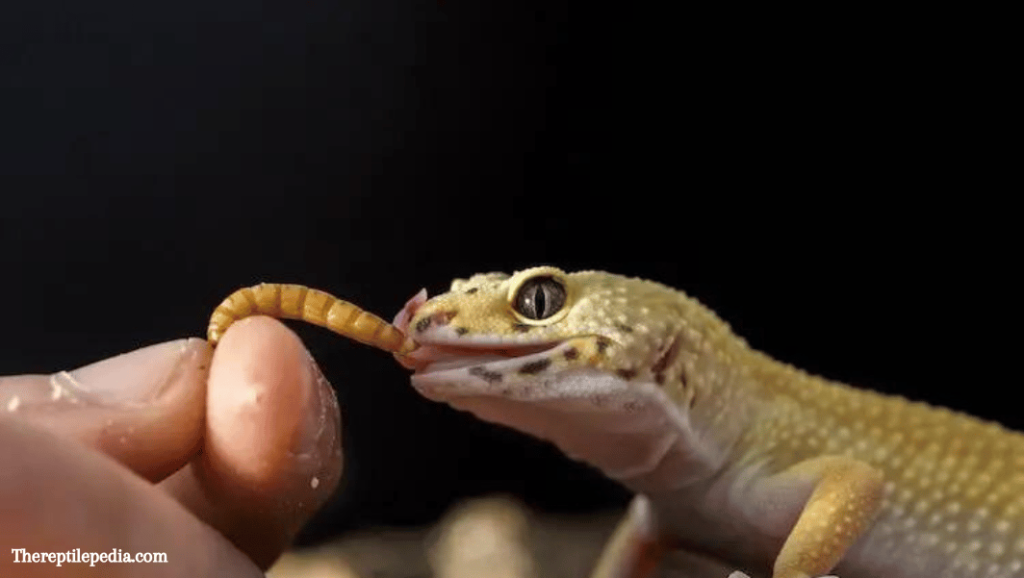
Choosing the right earthworms for your gecko can be crucial. From my experience, nightcrawlers are often a safe bet. They are large, so for smaller geckos, they can be cut in half to better accommodate their feeding needs. However, it’s important not to buy these worms from sources like fishing bait shops, as they may be treated with harmful chemicals. These chemicals are not only dangerous for geckos but also for other reptiles and amphibians.
Red wiggler worms are another popular option but with a caveat. While they are frequently used with reptiles, it’s advisable to avoid these if possible because they secrete an unpleasant substance when stressed, which might cause your gecko to spit them out. Additionally, dyed or chemically treated worms should never be used, as they can contain toxins. If you’re considering catching worms from outside, be aware of chemicals from human activity like pesticides. It’s always safer to use worms that have been raised specifically as feeders, ensuring they are 100% safe and free from harmful substances. This way, you can be sure your gecko is getting the best and safest diet possible.
Do all Leopard Geckos Eat Earthworms?
When considering earthworms as a diet for leopard geckos, please note that not all will eat them. As someone who has cared for these reptiles, I’ve observed that some leopard geckos may smell the earthworms and reject them instantly. This behavior is not uncommon, so don’t be worried if you try feeding earthworms to your gecko and it refuses to eat them.
Each leopard gecko has its unique preferences and behaviors, and earthworms are no exception. Completely turning away from earthworms is a natural response for some geckos. This doesn’t necessarily indicate a problem with the worm or the gecko; it’s simply a matter of personal preference. It’s important to respect these preferences and offer a variety of foods to ensure a balanced diet.
Can Baby Leopard Geckos Eat Earthworms?
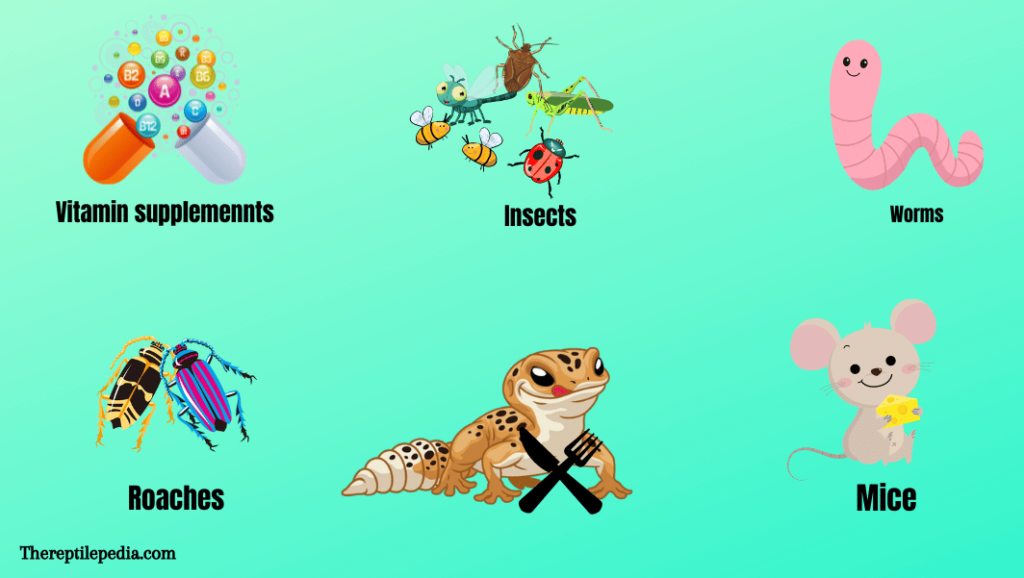
When it comes to baby leopard geckos, it’s best not to feed earthworms to them. Their digestive system is not in an excellent position to digest something as large and complex as an earthworm, which could harm them. Typically, baby geckos, measuring approximately 1/4 inch in size, are much smaller than the average size of a fully-grown leopard gecko, which is around 10-14 inches. Considering their small size and delicate digestive systems, the best diet for a baby gecko includes roaches, crickets, and small mealworms – all of which are much easier for them to handle compared to earthworms.
Do Leopard Geckos Eat Earthworms in the Wild?
In the wild, leopard geckos are strict insectivores and their diet includes a wide variety of insects. This typically includes crickets, locusts, flies, beetles, spiders, grasshoppers, snails, cockroaches, silkworms, and others. Earthworms, however, are generally not part of their natural diet for two main reasons. The first reason is their large size, which needs to be considered about the restricted size of a leopard gecko’s intestines. They can’t eat earthworms whole without risking digestive issues. The second reason is the revolting taste of earthworms, characterized by a mucus-like stimulant that can expel in distress if consumed.
Even when starving, leopard geckos in the wild would typically approach other food sources before considering earthworms. In the wild, leopard geckos are strict insectivores and their diet includes a wide variety of insects. This typically includes crickets, locusts, flies, beetles, spiders, grasshoppers, snails, cockroaches, silkworms, and others. Earthworms, however, are generally not part of their natural diet for two main reasons. The first reason is their large size, which needs to be considered about the restricted size of a leopard gecko’s intestines.
They can’t eat earthworms whole without risking digestive issues. The second reason is the revolting taste of earthworms, characterized by a mucus-like stimulant that can expel in distress if consumed. Even when starving, leopard geckos in the wild would typically approach other food sources before considering earthworms.
Can You Feed Earthworms Found In the Wild?
No, it’s not advisable to collect earthworms from the wild to feed your leopard gecko. These earthworms might be contaminated with various pollutants, including insecticides, pesticides, herbicides, and fertilizers. Additionally, wild earthworms have been discovered to carry parasites like platyhelminths, protozoa, and nematodes, which can be harmful to your pet and lead to serious illnesses.
While a few contaminated earthworms might not immediately harm your pet, in the long run, they contain toxic substances that could make your gecko sick. Sometimes, it might be tempting to feed these to adult leopard geckos, but it is better to never do this, especially with juveniles.
Even for adult leopard geckos, it’s safer to buy earthworms from a store to prevent health risks. You should always get your pet’s food, including earthworms, from a reputable and authorized pet store or supplier. You can order online if you need help finding a reputable source. This ensures that the food is safe and appropriate for your pet’s dietary needs.
The Benefits of Earthworms in a Leopard Gecko’s Diet
Parasite-Resistant Food Choice for Leopard Geckos
Feeding earthworms to your leopard gecko can be a great idea, especially if your reptile likes this kind of snack. Earthworms have several attractive features; one of the most notable is their ability to resist several parasites. Unlike other potential food sources, earthworms tend to burrow in soil, and because of this habitat, most worms don’t carry much in terms of parasites. This makes them a relatively safer choice for your gecko’s diet, contributing to a healthy and varied nutritional plan.
Beneficial for Easy Digestion in Leopard Geckos
Earthworms are known for their very low chitin content, making them a perfect choice for reptiles that need easily digestible insects or worms. Their soft exoskeleton means they can be easily eaten by leopard geckos of all ages. When offering earthworms, it’s important to make sure the worm isn’t too large for the reptile and to avoid any that have been in contact with soil, animal waste, feces, or newly fertilized areas. Ingesting such contaminated substances can be dangerous for pets. It’s also worth noting that not all geckos will accept earthworms. Sometimes, it’s just a matter of the pet’s preference.
A Low-Fat Dietary Option for Leopard Geckos
Unlike butter worms or super worms that have a high-fat content, earthworms stand out with less than 2% natural fat content. This low-fat rating makes them a top pick for owners who are looking for low-fat treats for their geckos. The reduced fat content in earthworms offers a healthier, more balanced option, particularly beneficial for geckos requiring a controlled fat intake in their diet.
Why You Shouldn’t Feed Earthworms to Your Leopard Gecko
Earthworm Secretions
When it comes to feeding earthworms to leopard geckos, a significant concern is the secretion of liquid by the worms. This offensive fluid, often released by earthworms to protect their eggs, can be highly distasteful to geckos. Most geckos will never eat earthworms again after ingesting this substance. Some geckos may refuse to try them no matter how attractive you make them. Apart from secreting these fluids, earthworms also produce mucus for moisturizing their bodies, which helps in their respiration and fluid movement. However, this mucus can further deter leopard geckos from considering earthworms as a palatable food option.
Earthworms and Their Low Preference Among Geckos
Some geckos may never eat earthworms right from the get-go. When considering adding earthworms to your gecko’s diet, it’s wise not to order a large batch from the pet shop before you ensure they like eating this type of worm. If they don’t, you might end up with wasted money that could have been used for something else more to their liking. This low preference for earthworms among geckos is an important consideration for pet owners looking to diversify their pet’s diets.
High moisture content
While earthworms have high water content, which may seem beneficial, they may not be the best for leopard geckos. They contain more than 80% water, making it difficult to offer much in terms of nutrition to the reptiles.
Low Calcium-to-Phosphorus content
Leopard geckos must have more calcium than phosphorus in their diet. The average calcium-to-phosphorus content should ideally be around 2:1. However, in earthworms, this ratio is about 1:4. With such a nutritional disparity, geckos could suffer from health issues if they consume too much earthworms.
Low nutrient density
Apart from the low calcium, earthworms offer measly benefits in terms of overall nutrition. The low nutrient density of the worm makes it unsuitable as a main part of a reptile’s diet.
Soil safety concerns
The place where an earthworm is picked could determine if it carries parasites. It’s essential to know the origin of the earthworms if you’re considering them for your leopard gecko’s diet. Soil mixed with feces or other septic material can be deadly for your gecko. Therefore, it’s critical to take care of your reptile’s well-being by being cautious of these factors.
Assessing Earthworm Size for Feeding to Leopard Geckos
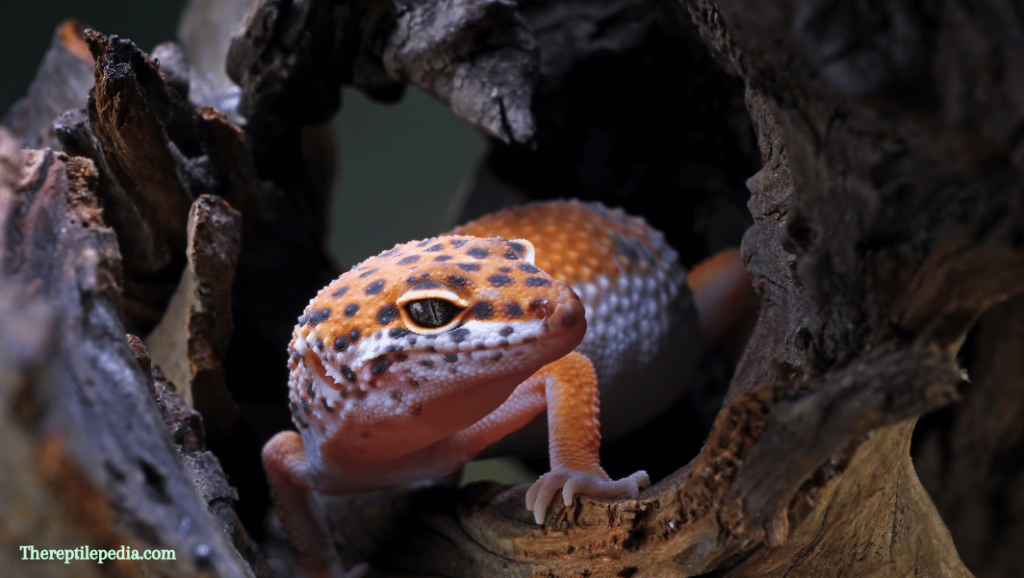
When feeding leopard geckos, whether they are adults, hatchlings, or juveniles, the size of their food is crucial. Typically, they eat worms and insects that measure around 2 1/2 inches for adults, 3/8 inch for juveniles, and 1/4 inch in length for hatchlings. However, the average size of an earthworm, which is 10-14 inches long, is far beyond this range. This size discrepancy can cause difficulty for leopard geckos, who may fail to consume these worms safely. Therefore, when considering earthworms as food, especially for smaller geckos, it’s important to consider cutting them down to size. However, this might be difficult to find and could incur additional costs.
Can Leopard Geckos Have Digestive Problems after Eating Earthworms?
Suppose your gecko begins to reject earthworms in its diet; this could indicate a possibility of impaction, which increases if the gecko ceases eating due to difficulty digesting them. Leopard geckos can have digestive issues that may accompany constipation or vomiting when fed inappropriate food items like earthworms. Therefore, it’s advisable to only feed your reptile earthworms if they are attracted to this insect. If you notice any sign of digestive discomfort or a lack of interest, it’s best to stop feeding them earthworms and consider alternative, more suitable dietary options for your leopard gecko.
Feeding Earthworms to Leopard Geckos
It is not recommended for leopard geckos to eat earthworms daily. While earthworms do provide moisture, they offer little else to benefit your pet’s diet. If you continue to feed too many of these, your gecko may become deficient in essential nutrients, which are crucial for their health. A balanced approach is key; earthworms should ideally be fed once or twice every two weeks. This frequency ensures that your leopard gecko enjoys the variety without compromising on the nutritional balance needed for optimal health.
Other Healthy Food Choices For Your Leopard Gecko
Mealworms
Mealworms are a common choice and are used to feed fishes, reptiles, and birds. However, they should not be a staple in a leopard gecko’s diet as they may cause impaction due to their tough exoskeleton.
Waxworms
Waxworms are safe, relatively easy to swallow, and have a low risk of impaction, making them an ideal feeder insect for birds, other reptiles, and leopard geckos.
Superworms
Superworms, too, are worms that leopard geckos can feed on, but they possess very strong, sharp jaws. It is advisable to break off these jaws if you want to feed them to your gecko. However, adult geckos find no trouble in eating superworms.
Hornworms
Please do not feed wild varieties of hornworms to leopard geckos as wild hornworms could contain harmful toxins. It is always safer to buy captive-bred hornworms whenever you need worms for your reptiles.
It’s important to gut-load hornworms with nutritious fruits and veggies. Gut-load them at least twenty-four hours before feeding to your leopard gecko. Also, don’t forget to dust these worms with calcium and vitamin supplements, including vitamins A and D3, to help your leopard gecko obtain the needed nutrients to thrive.
Butterworms
Several species of Butterworms, which are high in fat, can cause your gecko to gain unnecessary weight and shouldn’t be a staple in their diet. Offer butter worms no more than once or twice a month.
Silkworms
Buyers of silkworms should be careful as they can be expensive and addictive for your gecko. The massive budget required for silkworms makes them a less practical choice.
Dubia Roaches
Here’s a look at one of the top feeder choices – Dubia roaches. They are in increased demand due to being easy to digest and ideal for a crested gecko’s diet. They are also inexpensive to feed over long periods. However, ensure they are the right gut-loaders to be nutritious.
Crickets
Crickets are the most common rate insect, offering a lot of liquids, and can be bred at home if you aren’t constrained by larger space requirements. Ensure the crickets are not larger than the space between your gecko’s eyes for safe feeding.
Fruits
While many healthy fruits can be included in a leopard gecko’s diet, it’s important to prepare them properly. Fruits should be cut into small chunks or even blended into smoothies to make them easy for the geckos to eat. Some suitable fruits include Watermelon, Apricot, Dates, Peach, and Mango. These fruits offer a variety of nutrients and can be a delightful treat for your pet, adding diversity and flavor to their diet. However, always ensure the fruits are served in moderation and in appropriate sizes to avoid any health issues.
Water and Water Bowls
A critical part of feeding a leopard gecko, often referred to as a ‘Leo’, involves providing water. It’s essential to keep water bowls shallow on one side. This precaution ensures that if an insect gets inside the bowl, it doesn’t drown, preventing wasting of food and damage to the integrity of the water source. Always take a close look every day to make sure the water is clean and safe to drink. Some Leo might get into the water to cool off; if this happens, change out the water to keep it fresh. Additionally, placing the bowl in a cool spot in their habitat is adequate and also keeps bacteria at bay, ensuring a healthy environment for your gecko.
Also Read : Can Leopard Geckos Eat Superworms?
Earthworms in a Leopard Gecko’s Diet: A Rare Treat
In the world of reptile care, understanding the dietary needs of your leopard gecko, or Leo, is crucial for their well-being. A balanced diet is key, which means changing up the insects you feed them. After all, we do not eat the same foods every day, and your Leo appreciates a change of pace now and again. While earthworms can be a part of their diet, they should be offered rarely, as there are much better options out there. It’s advisable to stick to freeze-dried ones that come from your local pet store.
Optimal Diet for Leopard Geckos
The proper diet for your Leo might look like a combination of crickets, roaches, mealworms, and supplements, of course, along with water. Plus, you always want to make sure to dust the insects with calcium and D3 supplements, because those bought from a pet store may not contain adequate amounts of this nutrient.
Importance of Supplements
The process of coating insects should be done 1-2 times per week for adult Leos and daily for baby geckos and juveniles. Females laying eggs may require more frequent supplementation. You may also place a small dish of calcium powder in their habitat, so your gecko is sure to get enough vitamins, a necessary part of their well-being. Use supplements sparingly and do not give them on the same day as the coated feeder. Just coat the feeder insects once a week and offer them to your Leo. Make sure the supplement you opt for has the right calcium-to-phosphorus ratio, ideally 2:1, to ensure it is properly absorbed.
Administering Supplements
We often use Rep-Cal as our go-to for administering this process. Doing it is simple: just put the insects in a zip-lock bag or cup, shake it up gently until they’re coated, then give them to your Leo.
Personal Experience and Expertise
From my personal experience, maintaining a varied diet for your Leo is not only beneficial for their health but also keeps them interested in their meals. Observing how they eagerly wait for different insects each day is a rewarding part of reptile care. Remember, every Leo is unique, and what works for one may not for another, so always keep a close eye on their health and adjust their diet.
Conclusion
In the world of Leopard geckos, whether they can eat earthworms is a common query. They can, but it’s crucial to recognize that earthworms may not be the most important food source for these reptiles. Earthworms expel a foul-smelling mucus, the content of which can cause a slew of issues for your gecko. Due to this foul-smelling mucus, some geckos refrain from eating them.
Their large, oversized nature also makes them unsuitable for baby leopard geckos. Therefore, when you feed your adult pets, it’s essential to keep changing the diet to maintain its variety. Always buy only from reputable pet stores, and when offering various foods to your Leo, don’t force them to eat anything that you don’t think is good for them.
FAQs:
-
What kind of Worms Can Leopard Geckos Eat?
When considering the types of worms that leopard geckos can eat, it’s important to provide a variety for their diet. Beyond earthworms, they can safely consume mealworms, waxworms, and superworms. Each of these offers different nutritional benefits. However, their diet should not be limited to just worms. Including other insects like crickets, dubia roaches, and silkworms ensures a balanced diet. Beetles, butterworms, sow bugs, and tomato hornworms can also be part of their diet, but always ensure that these are appropriately sized, especially for younger geckos. This variety not only caters to their nutritional needs but also keeps mealtime interesting for them.
-
How Many Worms Does a Leopard Gecko Eat a Day?
When considering the diet of Leopard Geckos, it’s essential to understand their feeding needs at different life stages. Baby Leopard Geckos should be fed 5-7 small crickets or mealworms every day until they reach about 4 inches in length. As they grow, the size and frequency of their meals will change. Larger food should be offered every other day once they’re full-grown, which is typically around 10-12 months. For adults, feeding 6-7 large mealworms or equivalent-sized worms 2 to 3 times a week is sufficient. This schedule ensures they get the right amount of nutrients without overfeeding.
-
Do house geckos eat earthworms?
Most varieties of geckos, including leopards, African fat-tailed, tokays, house, flying, cave, and frog-eyed, are insectivores and have a diverse diet. They prefer a diet consisting of crickets, waxworms, earthworms, mealworms, fruit flies, moths, and grasshoppers. These should be offered every two to four days. Specifically house geckos can indeed eat earthworms, but these should be a part of a varied diet. It’s important to remember that some adult geckos also enjoy occasional treats like pinkie (infant) mice. This diverse diet ensures they receive all the necessary nutrients for healthy growth and development.

